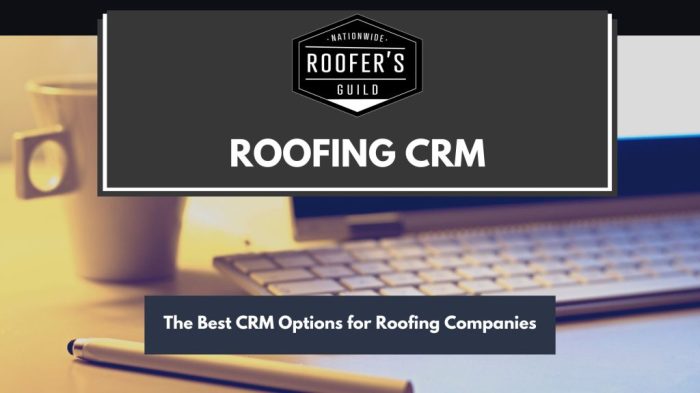Crm software for roofing contractors – The roofing industry is competitive. To thrive, you need more than just skilled crews and quality materials; you need efficient systems to manage leads, projects, and customer relationships. This is where a Customer Relationship Management (CRM) system becomes invaluable. This comprehensive guide explores how CRM software specifically tailored for roofing contractors can revolutionize your business operations, boosting efficiency, profitability, and customer satisfaction.

Source: roofersguild.com
Why Roofing Contractors Need a CRM
Many roofing contractors still rely on spreadsheets, sticky notes, and fragmented communication methods. This approach is unsustainable in today’s fast-paced market. A dedicated CRM offers a centralized hub for all your business interactions, providing significant advantages:
- Improved Lead Management: Capture leads from various sources (website forms, phone calls, referrals) and track their progress through the sales pipeline. No more lost leads slipping through the cracks!
- Enhanced Customer Communication: Maintain consistent and professional communication with clients, scheduling appointments, sending updates, and addressing concerns promptly. This fosters stronger relationships and positive reviews.
- Streamlined Project Management: Track project milestones, deadlines, and material orders efficiently. Reduce delays and ensure projects are completed on time and within budget.
- Increased Sales and Revenue: By optimizing your sales process and improving customer retention, a CRM can directly contribute to increased revenue and profitability.
- Better Team Collaboration: Enable seamless information sharing among your team, improving communication and coordination across departments.
- Valuable Data & Reporting: Gain insights into your business performance through comprehensive reporting and analytics. Identify trends, areas for improvement, and opportunities for growth.
Key Features of a Roofing CRM
Not all CRMs are created equal. When choosing a system for your roofing business, look for these essential features:
Lead Capture and Management
- Lead Sources Tracking: Identify where your most successful leads originate (e.g., website, referrals, advertising).
- Lead Scoring: Prioritize high-potential leads based on pre-defined criteria.
- Automated Lead Nurturing: Send targeted emails and follow-up messages to keep leads engaged.
- Integration with Online Forms: Seamlessly capture leads from your website.
Customer Relationship Management
- Centralized Customer Database: Store all customer information in one place, easily accessible to your team.
- Communication Tracking: Record all interactions with clients, ensuring consistent communication.
- Appointment Scheduling: Schedule and manage appointments efficiently, minimizing scheduling conflicts.
- Customer Segmentation: Group customers based on shared characteristics for targeted marketing efforts.
Project Management Capabilities
- Project Tracking: Monitor project progress, deadlines, and budget allocations.
- Task Management: Assign tasks to team members and track their completion.
- Document Management: Store and share project-related documents (contracts, estimates, photos).
- Material Tracking: Monitor material orders and deliveries to avoid delays.
Reporting and Analytics
- Sales Reports: Track sales performance, identify top-performing products/services, and pinpoint areas for improvement.
- Customer Retention Metrics: Measure customer satisfaction and identify areas for improvement.
- Marketing ROI: Assess the effectiveness of your marketing campaigns.
- Customizable Dashboards: View key metrics at a glance.
Integration with Other Tools, Crm software for roofing contractors
- Accounting Software Integration: Streamline financial processes by integrating with accounting software (e.g., QuickBooks).
- Email Marketing Integration: Automate email marketing campaigns to nurture leads and stay in touch with clients.
- Scheduling Software Integration: Synchronize appointments with your team’s calendars.
Choosing the Right Roofing CRM
Selecting the ideal CRM depends on your specific needs and budget. Consider these factors:
- Size of your business: A small business might require a simpler system than a larger enterprise.
- Budget: CRMs range in price from free options to expensive enterprise solutions.
- Features: Prioritize the features most important to your business operations.
- Ease of use: Choose a system that is intuitive and easy for your team to learn and use.
- Customer support: Ensure the provider offers reliable customer support.
Popular CRM Options for Roofing Contractors
Several CRM platforms cater to the specific needs of roofing contractors. Research and compare options such as:
- HubSpot CRM: A popular and powerful option with a free plan and scalable paid options.
- Zoho CRM: A comprehensive CRM with robust features and integrations.
- Salesforce: A leading CRM platform, known for its advanced features but often more expensive.
- JobNimbus: Specifically designed for field service businesses, including roofing contractors.
- ServiceTitan: A comprehensive software solution for home service businesses, including robust CRM capabilities.
Remember to request demos and trials before committing to a specific platform.
Frequently Asked Questions (FAQ)
- Q: How much does CRM software cost? A: Prices vary greatly depending on the provider and features. Some offer free plans with limited functionality, while others charge monthly or annual subscriptions based on the number of users and features.
- Q: How long does it take to implement a CRM? A: Implementation time depends on the complexity of the system and your business’s needs. It can range from a few days to several weeks.
- Q: Can I integrate my CRM with other software? A: Many CRMs offer integrations with other business tools, such as accounting software, email marketing platforms, and scheduling software.
- Q: What if my team isn’t tech-savvy? A: Most CRM providers offer training and support to help your team learn how to use the software effectively. Choose a user-friendly system that minimizes the learning curve.
- Q: Will a CRM improve my customer satisfaction? A: Yes, by improving communication, project management, and overall efficiency, a CRM can significantly enhance customer satisfaction and loyalty.
Conclusion
Investing in a CRM is a strategic move for any roofing contractor aiming for growth and sustained success. By streamlining operations, improving communication, and gaining valuable insights, a well-chosen CRM can transform your business. Take the time to research your options, consider your specific needs, and choose a system that empowers your team to deliver exceptional service and achieve greater profitability.
Call to Action: Crm Software For Roofing Contractors
Ready to take your roofing business to the next level? Explore the CRM options mentioned above and schedule a demo today! Don’t let inefficient processes hold you back – embrace technology and unlock your business’s full potential.
Quick FAQs
What are the key features to look for in roofing contractor CRM software?
Essential features include lead management, job scheduling, project tracking, customer communication tools (email, SMS), reporting and analytics, and integration with other business software.

Source: leaptodigital.com
How much does CRM software for roofing contractors typically cost?
Pricing varies widely depending on the features, number of users, and provider. Expect monthly subscription fees ranging from basic plans to more comprehensive options with higher price points.
Can CRM software integrate with my existing accounting software?
Many CRM systems offer integrations with popular accounting software. Check for compatibility with your current system before selecting a CRM provider.
How long does it take to implement a CRM system?
Implementation time depends on the complexity of the system and the size of your business. Expect a period of setup and training, ranging from a few weeks to several months.
What kind of training is required to use CRM software?
Most providers offer training resources, including tutorials, documentation, and sometimes personalized onboarding sessions. The learning curve varies depending on the software’s user-friendliness.
